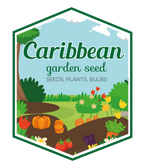
Jamaican White Soft Yam (STARTER PLANTS), Caribbean ROOT VEGETABLE,
- Get free shipping to lower 48 states on orders $54.95+ (Most Items), excluding live plants, plant bulbs, and black plastic nursery crate.
- Most orders are processed by the next day !
- Safe Seed Pledge
- Select your desired size and/or color from the available options.
Caribbean White Soft Yam, Jamaican Yam, yame negro
Yams are often mistakenly called sweet potatoes and vice versa, but these are actually two different vegetables. A true yam is the tuber of a tropical vine and it's not even distantly related to the sweet potato. Yams are a popular vegetable in Africa Latin American and the Caribbean. This tuber can grow over seven feet in length.
The yam's botanical name is dioscorea batatas.
Depending on country and region, it may also be called a boniato, njam, nyami, djambi, yamswurzel, ñame or igname de chine.
How to Identify a Real Yam
True yams are indigenous to Africa and Asia with most being grown in Africa, but there are over 150 varieties of yams available worldwide. True yams have rough, dark skin. Their flesh can range from white to a reddish color, and yellow but it's usually white.
Although you might find canned vegetables labeled as yams, these probably aren't true yams. Even the "yams" found in fresh produce sections of grocery stores are rarely real yams. They're soft sweet potatoes, which are different from firm sweet potatoes.
Africa, the native land of the yam, grows 95 percent of more than 600 varieties of the crop. Yams favor tropical and sub-tropical weather during their growing season and do not tolerate freezing.
Soil Preparation
Yams favor loose clay soil with good drainage. Gardeners test soils and adjust pH levels to about 5.5. They plow the planting area and dig trench rows with 3 1/2 feet between them. Gardeners then add compost into the trenches and check the soil for proper drainage. Tuber crops do not grow well in overly wet soils and require loose soil to allow room for drainage and growth.
Planting
After the tuber cuttings have lain out for one week, gardeners plant them 2 inches deep into the trenches with 18 inches between each planting. Gardeners lay mulch along the trenches after initial planting. Mulch keeps the ground moist without drowning the crop, protecting the tubers from extreme heat. About one month after twines emerge, gardeners place stakes into each mound at an angle to meet the stake in the adjacent mound, creating an A-frame structure for the two twines to climb and meet. The vines of yam plants are not sturdy and need support to produce high yields.
LET OUR CUSTOMER SPEAK FOR US

![[Seeds] - Caribbeangardenseed](http://caribbeangardenseed.com/cdn/shop/files/gift-card-gift-card-1_1024x1024_dfa857db-9150-4315-a362-7f0bb3fb9c47_60x28.png?v=1722895789)






